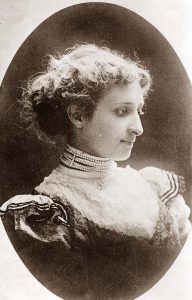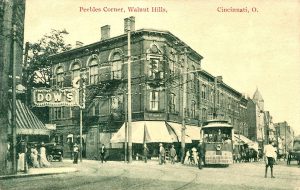 The late nineteenth and early twentieth centuries saw an explosion of consumer products, and produced a revolution in retail sales. Where were the new economic actors going to buy and sell all that stuff? Drug stores stepped into the breach, expanding from pharmaceutical products and hard candy to a plethora of new products, including bathing soaps and cosmetics and more general merchandise.
The late nineteenth and early twentieth centuries saw an explosion of consumer products, and produced a revolution in retail sales. Where were the new economic actors going to buy and sell all that stuff? Drug stores stepped into the breach, expanding from pharmaceutical products and hard candy to a plethora of new products, including bathing soaps and cosmetics and more general merchandise.
Walnut Hills, a populous suburb with lots of transit traffic and middle class residents, boasted two locations of the upscale Dow’s Drug Store. In 1900, the first opened at the corner of McMillan and Kemper Lane, in the prime first floor space of the elegant Ransley Building; in 1908, an additional branch opened on the northwest corner of McMillan and Gilbert, directly across the street from the fancy Peebles Grocery store.
Cora Dow dominated the drug store business in Cincinnati in the late nineteenth and early twentieth centuries. The fact that a woman held this preeminent position is only one of the remarkable stories about Dow’s Drugs. The Peebles Corner store was Cora’s tenth; her was the second largest chain of Drug Stores in the country, the largest in Ohio – and still growing. Cora Dow’s stores, unlike the “shack” her father had run, were large, elegant, airy and extravagantly decorated. All claimed expensive corner locations. Many had quiet, secluded alcoves staffed exclusively by women where customers could discuss feminine needs without embarrassment. Many had soda fountains, onyx and marble creations that cost $5000 or more when that amount would pay for a substantial house.
One of Dow’s downtown stores was the first in the city to remain open 24 hours, staffed overnight with both a pharmacist and a soda jerk. This arrangement, the store advertised, was better than a local druggist willing to get up in the middle of the night to dispense needed medications, since the bleary-eyed sole proprietor was more likely to make a mistake than a regular night-shift pharmacist.
 Yet the driving force in all business matters was high customer traffic and high volume sales. The large chain of stores allowed her to buy in bulk, and she was herself a prescription drug wholesaler. She saw both drugs and soda fountains as ways to bring customers into her stores; while she turned modest profits in both lines of business, she also got what internet businesses call “eyeballs” on her products and in-store specials at what were known as the time as “cut rate” prices. Dow’s Drug also advertised heavily in newspapers, street cars and bulletin boards – listing the low prices on brand name goods.
Yet the driving force in all business matters was high customer traffic and high volume sales. The large chain of stores allowed her to buy in bulk, and she was herself a prescription drug wholesaler. She saw both drugs and soda fountains as ways to bring customers into her stores; while she turned modest profits in both lines of business, she also got what internet businesses call “eyeballs” on her products and in-store specials at what were known as the time as “cut rate” prices. Dow’s Drug also advertised heavily in newspapers, street cars and bulletin boards – listing the low prices on brand name goods.
Manufacturers and retail competitors in many cases opposed her efforts to sell below manufacturer’s suggested retail. In one case, she briefly went to jail for contempt of court: she refused to identify the distributor who sold Dow’s the products which she then discounted. (The contempt charges were withdrawn and she continued to obtain the goods at wholesale.) Cora fought back with restraint of trade suits in state courts. She also entered into the trade of wines, liqueurs and whiskey, another industry in the throes of competition by “cut raters.”
Cora Dow at first hired mostly men, the norm in the drugstore industry. As her business grew, however, nearly half of her employees were women. Whether the feminization of the workforce was primarily a business decision to make the growing female customer base more comfortable is impossible to determine. She did, however, pay workers of both sexes equally for comparable jobs which defied the norms of the day. On the other hand, she claimed to prefer traditional sex roles and to oppose women’s suffrage.
Cora Dow became ill with tuberculosis in 1915. She arranged the sale of her business to a syndicate of Ohio business men, which closed only months before he death at the age of 47. The price was reported to be close to a million dollars. Her estate included substantial stock in the Rexall company, a cooperative buyer for branded patent medicines and other drug store products. She left $700,000 to the Cincinnati Symphony Orchestra. The Dow Drug company continued to operate under that name, and thrived for decades.